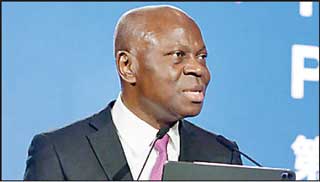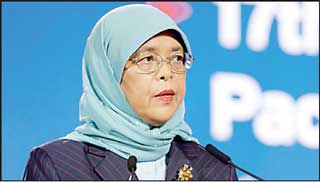Friday Feb 20, 2026
Friday Feb 20, 2026
Wednesday, 7 December 2022 00:22 - - {{hitsCtrl.values.hits}}
 |
| ILO Director General Gilbert F. Houngbo addresses the opening of the 17th Asia and the Pacific Regional Meeting in Singapore, 6 December 2022 |
 |
| Singapore President Halimah Yacob addresses the opening of the 17th Asia and the Pacific Regional Meeting in Singapore, 6 December 2022
|
The International Labour Organisation (ILO) yesterday in Singapore kicked off a crucial four-day
dialogue to usher inclusive growth with social justice, employment protection and decent work within the Asia Pacific and Arab States.
Converging for the first time in six years, the ILO’s 17th Asia Pacific Regional Meeting (APRM) with over 500 delegates taking part began discussing issues affecting employment and the world of work in Asia, the Pacific and Arab States. The conclusions will help shape the direction of national labour and employment policies as well as the ILO‘s work in both regions going forward.
Delegates included 19 ministers and vice ministers – representing governments, workers’ and employers’ organisations from 33 of the region’s 48 member countries including Sri Lanka. APRM was last held in 2016 in Bali and the gathering every four years didn’t take place in 2020 or 2021 due to the COVID-pandemic
Hosting the APRM for the first time, Singapore President Halimah Yacob inaugurated the forum along with ILO Director General Gilbert F. Houngbo.
The duo highlighted the need for inclusive growth as the regions build back from the COVID-19 pandemic.
“The Regional Meeting provides us a platform to unite in dialogue to navigate the uncertainties that lie ahead of us,” President Halimah Yacob told delegates. “The pandemic and recent economic upheavals have given us another opportunity to rethink our growth model. The ILO plays a critical role in ensuring a fairer and more inclusive growth model where everyone has a stake,” the President said.
She said member States attending the APRM account for over half of the global population, and more than a third of the global economy. “We need to promote timely public policies in the region to respond to the new realities of the labour market, with social dialogue at the heart of our approach,” said Halimah Yacob who is Singapore’s first female President.
ILO Director General Houngbo highlighted how the COVID-19 pandemic, combined with political, economic and climate crises had pushed social progress backwards.
“More than ever, workers are getting by on informal work, in jobs that provide little in the way of protection and security. We are now living under circumstances when labour standards, employment policies and social protection matter more than ever,” Houngbo said.
“We want everyone to be able to share equally in the benefits of future, human-centred growth,” he added.
Both the Asia-Pacific and Arab States labour markets have recorded a partial rebound from the impact of COVID-19 yet with conditions expected to remain difficult into 2023 prospects for investment, growth and full labour market recovery remain elusive.
Director General Houngbo highlighted that even without the considerable impact of the COVID pandemic, structural weaknesses within the Asia-Pacific and Arab States labour markets hampered decent and equitable job growth.
Limited progress on gender equality, the lack of social protection coverage for large parts of the population, stagnant labour productivity, high youth unemployment rates and persistently high levels of informality were all identified as major issues facing both regions.
“These underlying weaknesses need to be tackled if we are to deliver social justice and decent work,” Houngbo said.
“With effective pro-employment policies, more social protection, a respect for labour rights, constructive social dialogue and an enabling business environment, countries can equip themselves to benefit from the future of work,” he added.
The ILO Director General also stressed the importance of well-functioning labour market institutions.
“We saw during the pandemic response how the countries that had stronger labour market institutions were able to counteract some of the crisis shocks more efficiently and effectively,” he said.
However, the Director General recognised the challenges faced by ILO member countries to commit more resources during the current economic climate.
“It is not an easy task to scale up action toward the ILO’s decent work and social justice mandate. To advance through these turbulent times, we need to heighten our partnership with the multilateral system and work together through a Social Justice Coalition,” he added.